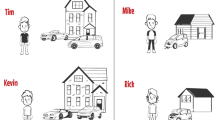Abstract
The effects of positive consequences on appropriate behavior at the beginning of a classroom experience were examined during an academic program for students with behavioral and academic difficulties. The results showed that the use of reprimands alone was associated with high levels of on-task behaviors during the initial days of the class. The addition of praise produced no change in the rate of on-task behaviors or the level of academic performance. The withdrawal of all consequences caused significant decreases in on-task behavior and academic productivity. The subsequent use of praise alone led to an initial increase followed by a dramatic decline in on-task performance, resulting in no change in the average rate of on-task behavior relative to the use of no consequences. These results are consistent with previous findings indicating the importance of reprimands for maintaining appropriate classroom behavior. Speculations regarding potential roles of praise are briefly discussed.
Similar content being viewed by others
References
Cohen, J. (1960). A coefficient of agreement for nominal scales.Educational and Psychological Measurement, 20, 37–46.
O'Leary, K. D., & Becker, W. C. (1968). The effects of the intensity of a teacher's reprimands on children's behavior.Journal of School Psychology, 7, 8–11.
O'Leary, K. D., Kaufman, K. F., Kass, R. E., & Drabman, R. S. (1970). The effects of loud and soft reprimands on the behavior of disruptive students.Exceptional Children, 37, 145–155.
Rosén, L. A., O'Leary, S. G., Joyce, S. A., Conway, G., & Pfiffner, L. J. (1984). The importance of prudent negative consequences for maintaining the appropriate behavior of hyperactive students.Journal of Abnormal Child Psychology, 12, 581–604.
Van Houten, R., Nau, P. A., MacKenzie-Keating, S. E., Sameoto, D., & Colavecchia, B. (1982). An analysis of some variables influencing the effectiveness of reprimands.Journal of Applied Behavior Analysis, 15, 65–83.
Author information
Authors and Affiliations
Additional information
The authors wish to thank classroom teacher Bonnie Chatterton for her exceptional cooperation and effort, Mark Gunning for his valuable assistance in the data collection, and Ann Abramowitz for her helpful editorial comments.
Rights and permissions
About this article
Cite this article
Acker, M.M., O'Leary, S.G. Effects of reprimands and praise on appropriate behavior in the classroom. J Abnorm Child Psychol 15, 549–557 (1987). https://doi.org/10.1007/BF00917240
Revised:
Issue Date:
DOI: https://doi.org/10.1007/BF00917240




